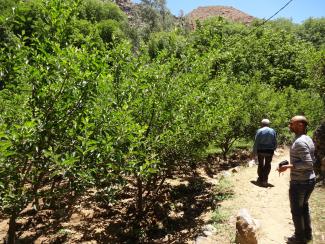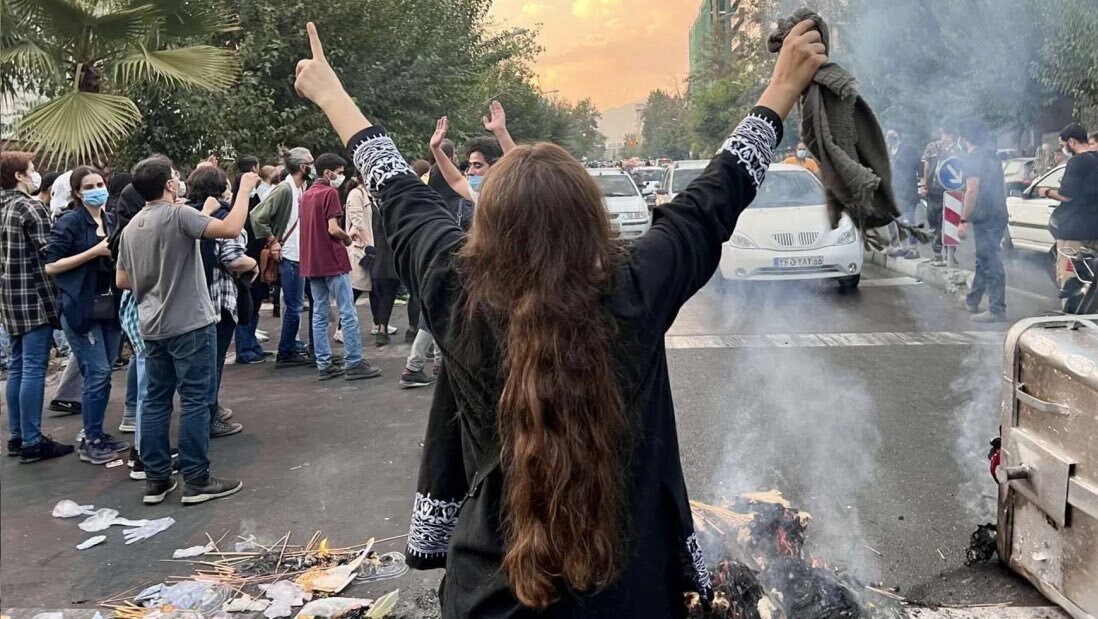Rural development
Involve the local community

Natural landscapes are deteriorating worldwide. Approximately 30 % of the world’s natural forests are expected to be lost by the end of this century. Furthermore, 25 % of all land on earth is currently threatened by desertification. The implications are severe soil erosion, reduced agricultural productivity, food insecurity and the dwindling of biodiversity.
Morocco is no exception. Over 90 % of Morocco’s historical forest cover has already been destroyed. The reasons are overexploitation, overgrazing and the worsening climate. The disastrous extent of Morocco’s environmental degradation puts at risk the country’s flora and fauna. Over 223 plant and animal species in Morocco are endangered, according to the Red List of the International Union for the Conservation of Nature (IUCN), the umbrella organisation of government agencies and non-governmental organisations.
Severe erosion, water run-off, floods and soil depletion have harsh impacts on human well-being too. That is particularly true in the Atlas region, where communities’ livelihoods depend on natural resources. The people concerned are socially marginalised and live in systemic poverty.
In this stressful scenario, environmental conservation is an important development issue. The political objective must be to mitigate all destructive trends. Accordingly, a wide range of projects has been started to provide communities with the twin goals of giving them control over their natural resources and generating socioeconomic benefits. However, it can be challenging to tackle environmental and societal issues at once. Many projects have failed to achieve either their conservation or their developmental goals – and some have not achieved either.
It is therefore essential to identify effective practices and share the lessons learned. The High Atlas Foundation (HAF), a non-profit organisation that is registered in Morocco and the USA, runs a pro-poor agroforestry programme in the North African country. On behalf of the HAF, I have assessed it, using a new methodology that allowed me to analyse the links between conservation management and community interventions as well as what they mean in terms of poverty reduction and biodiversity improvements.
My work included the desk-based review of relevant documents, 34 interviews plus discussions with six focus groups that involved seven staff members and 26 beneficiaries. The data was compiled in a booklet, upon which a group of independent professionals relied to score the performance of the programme, determine which practices were successful, identify gaps and give recommendations for further improvement. The evaluation revealed that the programme was highly effective and should serve as an international model.
Since 2003, HAF has planted 3.6 million seeds and trees. As strong increase occurred in 2018. The reason was that four new nurseries were established in partnership with Morocco’s High Commission of Water and Forests and Ecosia, a social business based in Berlin.
One successful intervention was to distribute fruit trees. As a result, subsistence farms that cultivated barley and corn started to sell surplus organic fruit, considerably improving peoples livelihoods. There are environmental benefits too as the trees reduce both soil erosion and flooding. The cultivation of fruit trees thus helps to preserve the natural environment.
Soil quality and plant regeneration are very important, given that erosion and desertification are imminent threats, which are exacerbated by farming of staple food and cattle herding. One farmer observed: “Previously, we only grew barley and corn, and the soil deteriorated fast, so erosion took away our land. Now the trees prevent this from happening. We also have more bees because bees love the blossoms.”
The difference cherry trees make
In the Tifnoute Valley of the Taroudant province, for example, the foundation distributed 10 to 100 cherry trees per farmer. Skills training was offered accordingly. The annual revenue per tree amounts to the equivalent of $ 21 to $ 105, depending on water availability, harshness of winters and other factors. On average, the revenues from cherry sales are ten times as much as farmers were able to earn from barley and corn.
All in all, HAF was able to improve the incomes of approximately 10,000 households. One farmer stated: “Before we cultivated cherries, we had to work hard to grow corn and barley. If I counted everything together and sold all the barley and corn without keeping anything for myself, I only gained $ 53 a year. A few years after the foundation gave me trees I was able to sell the fruits for $ 528 to $ 1,055 depending on how much my trees produced. With the income generated, I improved my family’s life.”
Higher incomes enabled communities to reinvest some of the money in communal infrastructure, including schools, health facilities or youth enterprises. Key to this success was the foundation’s holistic strategy to meaningfully engage the local communities. Villagers are involved in every single step. They are entrusted with the authority to make decisions and increasingly become agents of change.
Involving the people ensures early community buy-in, prevents programmes from being driven by external interests and ensures a thorough understanding of the local context. Furthermore, HAF addresses poverty from all angles by running workshops to empower women, train skills, promote literacy et cetera. HAF acknowledges that poverty does not simply mean shortfalls of income or food. Other symptoms include the lack of access to education and opportunities in general. Empowerment is therefore the means to reduce inequality.
One woman said: “This tree and plant nursery changed our lives. Before, we were expected to stay at home. Thanks to the help of the foundation we are able to work in the nursery, learn new skills, earn our own money and help to provide for our families. This makes our life much easier, and men are starting to respect us. We are very proud of what we do even when we encounter problems. We learned how to face the problems together, search for solutions and keep going.”
The HAF has proven that meaningful community engagement through participatory methods is essential to sustainable, long-term success. Community engagement should never be an afterthought or rhetorical, but should be fundamentally integrated into every conservation and development project. The HAF is happy to share information and experience with interested parties internationally.
A farmer concluded: “I have great expectations for the future. The trees we planted will be good for the environment, prevent soil erosion, and the project will benefit the communities and the associations in this area.”
Kerstin Opfer earned her master’s degree in conservation and rural development at the University of Kent. She has travelled, worked and lived in Morocco for over four years. She evaluated the programme of the High Atlas Foundation from April to September last year.
kerstin.opfer@gmail.com
Link
High Atlas Foundation:
http://www.highatlasfoundation.org











